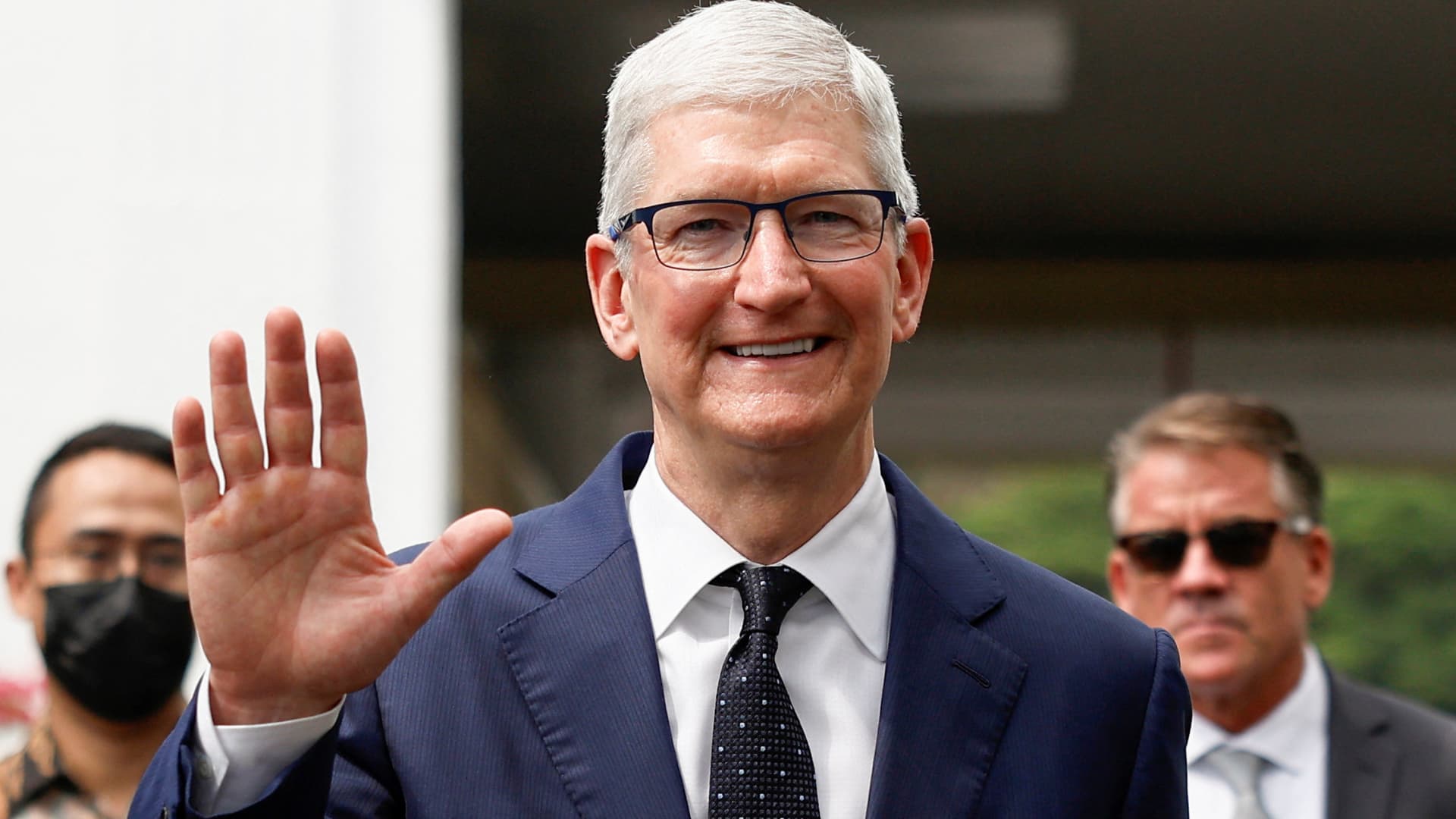
Apple shares climbed 7% in extended trading on Thursday after the iPhone maker reported fiscal second-quarter earnings that topped estimates and announced an expanded stock buyback program.
Apple announced that its board had authorized $110 billion in share repurchases, a 22% increase over last year’s $90 billion authorization. It’s the largest buyback in history, ahead of Apple’s previous repurchases, according to data from Birinyi Associates.
However, overall sales fell 4% and iPhone sales fell 10% year over year during the quarter, which Apple attributed to a tough comparison versus last year.
Here’s how Apple did versus LSEG consensus estimates in the quarter ended March 30:ÂÂ
- EPS: $1.53 vs. $1.50 estimatedÂÂ
- Revenue: $90.75 billion vs. $90.01 billion estimatedÂÂ
- iPhone revenue: $45.96 billion vs. $46.00 billion estimatedÂÂ
- Mac revenue: $7.5 billion vs. $6.86 billion estimatedÂÂ
- iPad revenue: $5.6 billion vs. $5.91billion estimatedÂÂ
- Other Products revenue: $7.9 billion vs. $8.08 billion estimatedÂÂ
- Services revenue: $23.9 billion vs. $23.27 billion estimatedÂÂ
- Gross margin: 46.6% vs. 46.6% estimatedÂÂ
Apple did not provide formal guidance, but Apple CEO Tim Cook told CNBC’s Steve Kovach that overall sales would grow in the “low single digits” during the June quarter. ÂÂ
Apple posted $81.8 billion in revenue during the year-ago June quarter and LSEG analysts were looking for a forecast of $83.23 billion. ÂÂ
On an earnings call with analysts, Apple finance chief Luca Maestri said the company expected the current quarter will deliver double-digit year-over-year percentage growth in iPad sales. What’s more, he said the Services division is forecast to continue growing at about the current high rate it’s achieved during the past two quarters.
Apple reported net income of $23.64 billion, or $1.53 per share, down 2% from $24.16 billion, or $1.52 per share, in the year-earlier period.
Cook told CNBC that sales in the fiscal second quarter suffered from a difficult comparison to the year-earlier period, when the company realized $5 billion in delayed iPhone 14 sales from Covid-based supply issues.ÂÂ
“If you remove that $5 billion from last year’s results, we would have grown this quarter on a year-over-year basis,” Cook said. “And so that’s how we look at it internally from how the company is performing.”ÂÂ
Apple CEO Tim Cook waves to journalists after his meeting with Indonesian President Joko Widodo at the Presidential Palace in Jakarta, Indonesia, April 17, 2024.ÂÂ
Willy Kurniawan | Reuters
Apple said iPhone sales fell nearly 10% to $45.96 billion, suggesting weak demand for the current generation of smartphones, which were released in September. The sales were in line with analyst estimates, and Cook said that without last year’s increased sales, iPhone revenue would have been flat. ÂÂ
Mac sales were up 4% to $7.45 billion, but they are still below the segment’s high-water mark set in 2022. Cook said sales were driven by the company’s new MacBook Air models which were released with an upgraded M3 chip in March. ÂÂ
Other Products, which is how Apple reports sales of its Apple Watch and AirPods headphones, was down 10% year over year to $7.9 billion.ÂÂ
During the quarter, Apple released its first new major product category in years, the Vision Pro virtual reality headset, but the $3,500 device is expected to sell in low quantities, especially compared to Apple’s major product lines. ÂÂ
“We’re only scratching the surface there so we couldn’t be more excited about our opportunity there,” Cook said.ÂÂ
Apple has not released a new iPad since 2022, which is a drag on sales. Revenue for the division fell 17% to $5.6 billion. Apple is expected to announce new iPads on May 7 that could revive demand for the product line. ÂÂ
Cook said that Apple has “big plans to announce” at its iPad product event next week and at the Worldwide Developers Conference in June. ÂÂ
The company’s Services business was a bright spot during the quarter. Sales rose 14.2% to $23.9 billion. That’s how Apple reports revenue from its subscription services, warranties, licensing deals with search engines, and payments. The company has a broad definition of subscribers, including users subscribing to apps through Apple’s App Store. It counts over 1 billion paid subscriptions. ÂÂ
Sales in Greater China, Apple’s third largest region, were off 8% to $16.37 billion in revenue, which was significantly better than the $15.25 billion in sales expected by FactSet analysts, potentially quelling investor worries the iPhone maker may have been losing market share to local competitors such as Huawei. ÂÂ
“I feel good about China. I think more about long term than to the next week or so,” Cook said.ÂÂ
Cook told CNBC that iPhone sales grew in China during the quarter, which “may come as a surprise to some people.” ÂÂ
In addition to the buyback authorization, Apple said it would pay a 25-cent dividend, a 1-cent increase.
Correction: Cook said that Apple has “big plans to announce” at its iPad product event next week and at the Worldwide Developers Conference in June. An earlier version misstated the context of the plans.
Read the original article here


